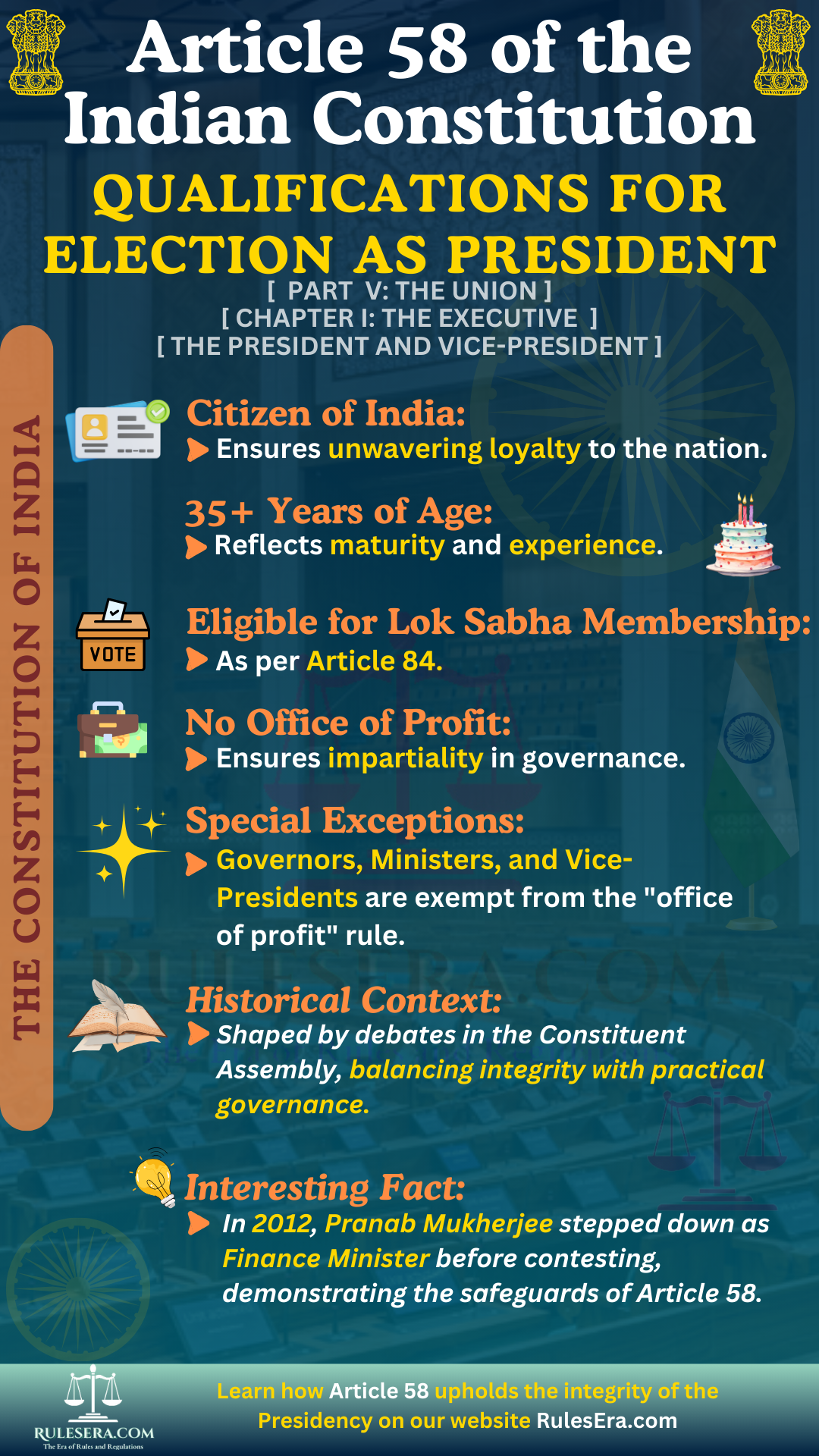Part V: The Union
Chapter I: The Executive
Article 58: Qualifications for Election as President

--- Original Article ---
(1) No person shall be eligible for election as President unless he—
- (a) is a citizen of India,
- (b) has completed the age of thirty-five years, and
- (c) is qualified for election as a member of the House of the People.
(2) A person shall not be eligible for election as President if he holds any office of profit under the Government of India or the Government of any State or under any local or other authority subject to the control of any of the said Governments.
Explanation: For the purposes of this article, a person shall not be deemed to hold any office of profit by reason only that he is the President or Vice-President of the Union or the Governor of any State or is a Minister either for the Union or for any State.
Explanation
Article 58 of the Constitution of India outlines the qualifications necessary for an individual to contest the Presidential election. It ensures that only those with the appropriate qualifications and no conflict of interest can hold the highest office in the Republic of India.
Key Provisions
- Clause 1(a): The person must be an Indian citizen, ensuring their loyalty to the country.
- Clause 1(b): The individual must be at least 35 years of age, reflecting the maturity required for the role of President.
- Clause 1(c): The candidate must meet the qualifications for election to the House of the People, including mental soundness, not being bankrupt, and meeting other legal requirements.
- Clause 2: Disqualifies individuals holding an office of profit under the government from contesting the Presidential election, ensuring impartiality in the office.
- Explanation: The explanation exempts individuals holding high public offices such as the President, Vice-President, Governors, and Ministers from disqualification under the office of profit rule.
Amendments and Real-Life Examples
- Amendments: The Constitution (Seventh Amendment) Act, 1956 removed the term "Rajpramukh" following the abolition of the role during the reorganization of states, reflecting the evolving administrative structure of India.
- Real-Life Example: In 2012, Pranab Mukherjee resigned from his position as Union Minister of Finance to contest the Presidential election, demonstrating how Article 58 ensures no conflict of interest when assuming the office of President.
Historical Significance
Article 58 reflects the framers' vision of a qualified, impartial, and experienced individual assuming the office of the President. Drawing inspiration from international practices, this article ensures that the President of India is not only a unifying figure but also someone who meets strict eligibility criteria.
Legislative History
Article 58, initially drafted as Article 47, underwent extensive deliberation on December 27, 1948 and October 13, 1949, before being incorporated into the Indian Constitution.
Debates and Deliberations
During the Constituent Assembly debates on Article 47 (now Article 58), several significant amendments were proposed. Prof. K. T. Shah introduced a clause (d) disqualifying individuals convicted of treason, offenses against the state, or violations of the Constitution. He argued that such disqualifications were necessary to safeguard the presidency's integrity, drawing historical parallels with the fall of the Roman Republic.
Dr. B. R. Ambedkar proposed two key amendments: replacing "any office or position of emolument" with "any office of profit," which was adopted, and including an explanation allowing Governors and Ministers at both the Centre and States to contest the Presidential election. These amendments aimed at balancing the office's accessibility while ensuring impartiality.
Further debates occurred around the necessity of preventing sitting ministers from contesting the Presidential election without resigning. Prof. Shah proposed such a requirement, but Dr. Ambedkar countered that it would cause administrative chaos. He emphasized the Election Commission’s role in ensuring a fair election.
Shri H. V. Kamath supported Prof. Shah’s proposal for disqualifying individuals convicted of treason or violating the Constitution, seeking clarification from Dr. Ambedkar on whether this should be explicitly stated. Dr. Ambedkar responded that the existing disqualifications for parliamentary elections sufficed for Presidential elections.
Ultimately, the Assembly accepted the amendments, and Article 58 was adopted into the Constitution, ensuring the qualifications for the office of President were clear, balanced, and effective.
Frequently Asked Questions (FAQs):
The candidate must be a citizen of India, at least 35 years old, and meet the qualifications for election to the House of the People. They must not hold an office of profit under the Government or its controlled bodies.
Yes, individuals holding positions like Minister, Vice-President, or Governor are exempt from the "office of profit" rule, allowing them to contest the Presidential election without resigning their position.